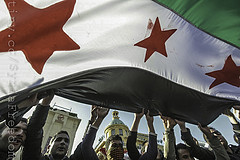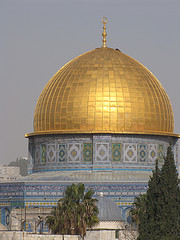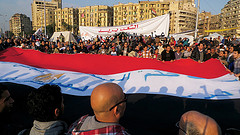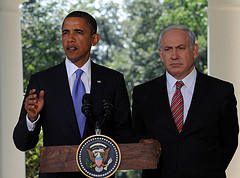
Lifting the Siege: Protecting Civilians in Syria
Even the most zealous ideologues have been challenged approaching Damascus. Thrown from their horse, they have been left dazed and partially sighted, forced to re-examine their norms. Damascus has presented such a challenge once again in recent months. This time, it is the new norm in international relations known as R2P—the responsibility to protect—that has been temporarily unseated. It is a simple formula. This important new norm contends that it is the international community’s responsibility to protect civilians when a state fails in its responsibility to do so. R2P has made swift progress in the international community since its adoption (in a watered-down form) at the United Nations Summit in 2005, gaining acceptance at the same time as the rise …

Conference Report: The Egyptian Revolution, One Year On
Having toppled a dictator of thirty years in the uprisings of January and February 2011, millions of Egyptians looked ahead to a future of comprehensive change. In May 2012, they faced the disturbing prospect of choosing a new president from a list that included Mubarak’s last prime minister, and foreign minister. When the former, Ahmad Shafik, was allowed to pass through to the second electoral round, waves of nationwide protest decried his candidacy. Yesterday, to the alarm of pro-revolution political forces, the High Constitutional Court dissolved parliament, and legislative powers passed to the ruling military council. Several prominent activists have slammed the entire transitional process, and have been protesting with fellow Egyptians to boycott a poll they dismiss as illegitimate …
‘Federalism’ in Libya: Already in the dustbin of History
In today’s Libya, local is king. Yet, if Libya is to become a functioning state governed by an elected leadership capable of empowering its citizens and providing an equitable distribution of its resource wealth, then, the interim government of the National Transitional Council (NTC) must become king. In the run-up to the June elections many militias and civil society organizations are lambasting the interim government’s mission to centralize authority rather than its lacklustre results at achieving that task. On March 5th, notables in Benghazi — Libya’s second city and capital of the Eastern region of Cyrenaica — proposed to compensate for the ineffectiveness of the central NTC authorities by asking them to relinquish certain powers to sub-state bodies such as …

Should America Care About Energy Independence?
For the past forty years, the United States has been dependent on foreign oil. In the early 1970s, declining domestic production and America’s ever increasing thirst for oil made dependency on imports a necessity, whilst the OPEC Revolution and the 1973 Arab oil embargo seemed to also make dependency a serious threat to national security. Beginning with the formulation of Nixon’s “Project Independence”, the US has sought to reverse this worrisome position and restore what is usually imagined as a quasi-paradisiacal state of nature: energy independence. Yet, while president after president emphasised the importance of tackling the problem, US net oil imports kept rising, until they peaked in 2005 at about 12.5 million barrels of oil per day, 65% of …

Preventing progress in Palestine: Israel must do more to break the deadlock
In Israel and the Palestinian territories, decades of conflict have not offered ripe soil for mutual understanding and peace on reasonable terms. Endless confrontation has eroded hopes for successful negotiations. Nonetheless, the frequent reference to a ‘status quo’ in the Israeli-Palestinian conflict is mistaken – in my opinion, it’s pure political rhetoric and this conflict is anything but one of attrition. Every day, new settler houses are being built in the West Bank and east Jerusalem – on Palestinian land. Everyday bricks are added to the anti-terrorist fence (or apartheid wall, as some call it), thereby outcasting communities of shared history, as well as hindering commerce and splitting communities (and families) apart. The Israeli government, meanwhile, has authorised the building …
Solve Syria, Don’t Provoke Iran
From Project Syndicate in Collaboration with Martin Van Creveld: Israel is daily ratcheting up its threats to attack Iran over its nuclear program. Unfortunately, these threats have come to overshadow more pressing events in Syria, which is the epicenter of a regional crisis that will determine the future of the Arab Spring, as well as Iran’s role in the Middle East. Throughout 2011, the Arab uprisings were driven by each country’s internal dynamics. Yet the disparate movements were united by the pursuit of freedom, dignity, and economic opportunity. Now this liberal narrative is breaking down. Chaos reigns in Egypt and Libya, where post-revolution authorities are proving too brittle either to consolidate their authority, or to incorporate more popular forces. In …

An absent-minded Islamic Revolution? The rise of the Islamists after the Arab Spring
The Arab world shocked us twice in recent months, once with the eruption of the revolutionary spring, and again with the sweeping to power of Islamist parties. The revolutions have radically shifted the political map of the region and transformed the world’s perception of its politics, and even transformed the world. But the equally unanticipated, and very decisive, ascendancy of the Islamists, from Morocco to Kuwait, has confused many observers. Already some are repeating the old adage, voiced most provocatively by Elie Kedourie in 1992, that the Arabs do not comprehend, let alone desire or deserve democracy. It is interesting that Kedourie was responding to the results of an opinion poll which showed that the majority of Egyptians supported democracy, …

Obama must stand up to Netanyahu
Reposted here is my op-ed in today’s Independent on Obama’s meeting with Netanyahu. It is clear what kind of Israeli prime minister President Obama will be receiving at the White House today. Benjamin Netanyahu is a bellicose, right-wing Israeli nationalist, a rejectionist on the subject of Palestinian national rights, and a reactionary who is deeply wedded to the status quo. Nationalism has an in-built tendency to go to extremes and Netanyahu’s brand is no exception. A nation has been defined as ‘a group of people united by a mistaken view about the past and a hatred of their neighbours’. This definition fits the Likud leader on both counts: he has a selective and self-righteous view of his own country’s history and …









